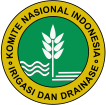OPTIMASI PEMBERIAN AIR IRIGASI TANAMAN MELON (Cucumis Melo L.) PADA SISTEM POCKET FERTIGATION DENGAN ALGORITMA GENETIKA
Abstract
Irrigating and fertilizing (known as fertigating) should be applied more effectively and efficiently. Pocket fertigation technology as an alternative fertigation was developed to achieve those purposes. The main challenge applied to the technology is to determine the optimum irrigation water. The objective of the study is to optimize irrigation water of the pocket fertigation, particularly in determining the optimal soil moisture during the growth stage by genetic algorithms. The method was developed based on one planting season of melon (Cucumis Melo L) cultivation under two different emitter of pocket fertigation with two different water irrigation regimes as well as the control. The treatments were pocket fertigation with textile layer emitter and wet irrigation (PK-H), textile layer emitter and dry irrigation (PK-L), emitter without layer and wet irrigation (PT-H), emitter without layer and wet irrigation (PT-L), and control with wet irrigation (PC-H) and dry irrigation (PC-L), respectively. The genetic algorithms model was developed with the objective function to achieve optimum fruit fresh weight and sweetness level. As the results, the optimum soil moisture is 0.34; 0.32; 0.31; 0.30; 0.26; 0.30; and 0.29 m3/m3 for every 9 days during the planting period. This value is thought to produce optimum fruit with a weight of 1115 g, a sweetness value of 8.6 brix, and increased water productivity of 27-46%. In addition, the pocket fertigation increased water productivity by 14,17% compared to without the pocket fertigation.
Keywords: irrigation water, genetic algorithm, pocket fertigation, water productivity
Full Text:
PDFDOI: https://doi.org/10.32679/jsda.v19i1.825
Refbacks
- There are currently no refbacks.
Copyright (c) 2023 Abdul Malik, Chusnul Arif

This work is licensed under a Creative Commons Attribution-ShareAlike 4.0 International License.















